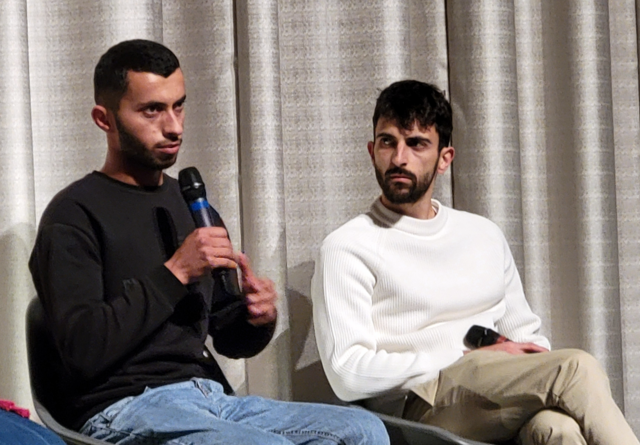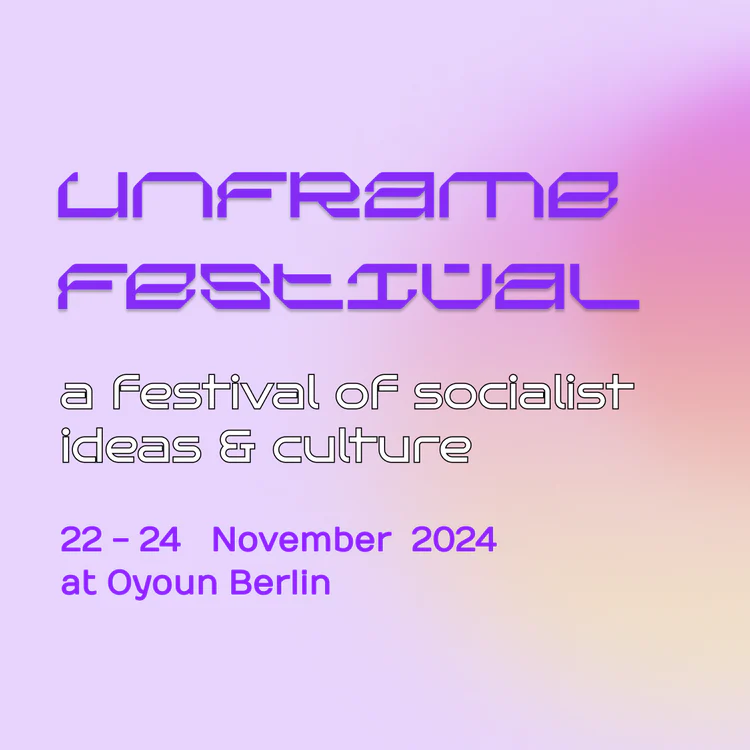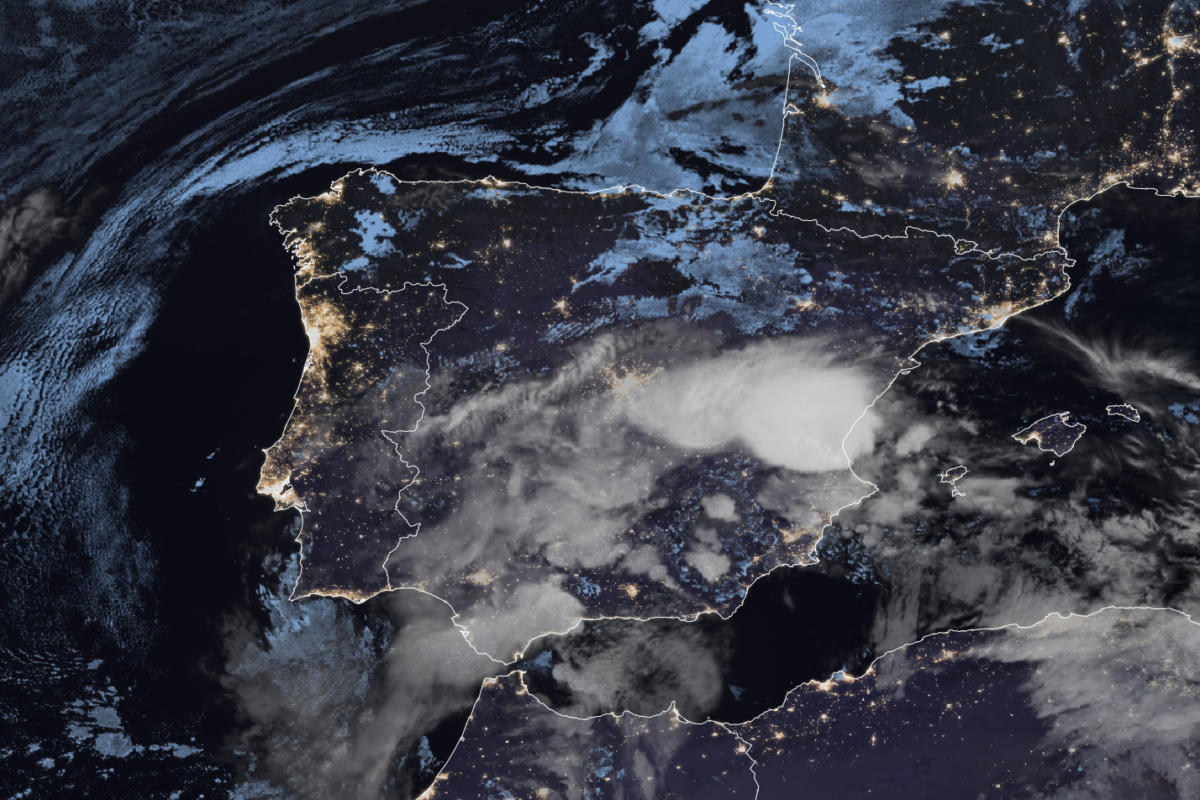This weekend, Berlin’s Oyoun transforms into a hub of resistance and creativity with the Unframe Festival, running from November 22 to 24. This three-day event brings together lectures, panel discussions, workshops, theatre, and film in German and English to tackle themes like decolonization, anti-capitalism, intersectionality, and collective liberation. Unframe provides a critical space for confronting systemic oppression while imagining alternative futures through knowledge and cultural expression.
In a world where authoritarianism is rising, and inequality continues to deepen, Unframe offers a platform for activists, thinkers, and artists to reflect, strategize, and inspire. Through its diverse programming, the festival blends political engagement with cultural exploration, creating an opportunity for meaningful dialogue and action.
Challenging Colonial Narratives and Historical Legacies
Unframe opens with discussions that confront the lasting impacts of colonialism and imperialism. One standout session is “Is German guilt to blame for the oppression of Palestinians?”, which examines how Germany’s historical reckoning with the Holocaust has shaped its policies toward Palestine. This deeply reflective lecture highlights the tensions between historical responsibility and current political realities, offering a thought-provoking start to the festival.
The theme of colonial legacies continues with “Das Gewicht der Wörter” (The Weight of Words), a panel on Saturday featuring Moshtari Hilal and Sinthujan Varatharajah. This session dives into how language is wielded as both a tool of oppression and a medium of resistance, inviting participants to rethink how narratives shape power dynamics.
On Sunday, “Antizionistische JüdInnen unter Generalverdacht” (Anti-Zionist Jews Under General Suspicion) addresses the challenges faced by Jewish voices critical of Zionism. This session sheds light on the stigmatization and marginalization of these perspectives, framing them as an essential part of global liberation movements. “Decolonial Jewish Diasporism” expands on this by imagining Jewish identity beyond nationalist frameworks, emphasizing solidarity with decolonial struggles worldwide.
Intersectionality in Action
A key strength of Unframe is its ability to connect struggles across race, gender, class, and geography, highlighting the systemic forces that shape oppression. On Saturday a panel “(Un)Democratic Mechanisms” explores how modern democracies often fail to serve marginalized communities. Featuring Pauline Jaeckels, Lucas Febraro, and Alexander Gorski, and moderated by James Jackson, the discussion critiques democratic structures and their inability to uphold civil liberties.
For those drawn to feminist critique, “Imperialer Feminismus – eine marxistische Analyse” (Imperial Feminism – A Marxist Analysis) on Friday offers a sharp analysis of how capitalist and imperialist frameworks co-opt feminist movements, undermining their transformative potential. This session provides a critical lens on how gender equality is often commodified within global systems of power.
Saturday also offers unique opportunities for collaboration and creativity through workshops. “Imaginative Justice” by Salma Said and Miriam Coretta Schulte stands out as it is conducted in three languages – English, German, and Arabic. This interactive session challenges participants to imagine a world free of borders, surveillance, and exclusion, blending accessibility with radical creativity. It exemplifies Unframe’s commitment to fostering inclusivity and collective participation.
Climate Justice and Resistance
The intersection of climate justice and anti-imperialism is another major theme at Unframe. On Saturday, “Klimagerechtigkeit, Antiimperialismus & die Klimabewegung” (Climate Justice, Anti-Imperialism, and the Climate Movement) critiques the neoliberal co-optation of climate activism. Speaker Hasan Özbay calls for a return to anti-imperialist principles, urging activists to address the global inequalities at the heart of the climate crisis.
On Sunday, the panel “The unity of our struggles, the diversity of our tactics” emphasizes the importance of solidarity across movements, focusing on the connections between environmental justice and liberation struggles worldwide.
Cultural Expression and Storytelling
Unframe’s cultural programming underscores the power of art and storytelling in resistance. The “Memories Carried” art exhibition runs throughout the weekend, showcasing works that explore themes of migration, displacement, and resilience. Guided tours provide deeper insights into the artists’ processes, making this an essential experience for attendees.
The festival also features a carefully curated selection of films. Friday’s screenings include “In Limbo” by Tutku Efe, a narrative on resilience after systemic destruction, and “Uncle, Give Me a Cigarette” by Jamen Abu-Khatir, which reflects on longing and loss amidst displacement. On Sunday, “Taste of Cement” by Ziad Kalthoum offers a visually stunning exploration of Syrian construction workers in Beirut, caught between rebuilding a foreign city and mourning the destruction of their homeland. The screening will be followed by a Q&A with Ziad.
Saturday’s “Bleib ängstlich – bleib sicher” (Stay Fearful – Stay Safe) combines German and English storytelling in an experimental theatrical performance. The show explores how fear shapes individual and collective identities, providing a powerful commentary on the ways we navigate security and uncertainty in modern life.
Why Unframe Matters
Unframe Festival stands out for its ability to weave together intellectual debate, grassroots activism, and cultural expression. Its programming not only confronts systemic injustices but also celebrates the resilience and creativity of those fighting for liberation. For someone like me, drawn to the intersections of politics, storytelling, and activism, sessions like “Das Gewicht der Wörter”, “Eye witness report from West Bank”, and “Imaginative Justice” exemplify the festival’s capacity to inspire and connect.
Whether you’re interested in the global implications of climate justice, the intricacies of democratic systems, or the role of art in resistance, Unframe has something to offer. It’s more than a festival – It’s a call to action, inviting us to imagine and work toward a better world. This weekend at Oyoun is an opportunity to learn, connect, and reflect on the movements shaping our future. Join the conversation and be part of the change.
For more information, visit their Instagram or official website.
Check the timetable here.




